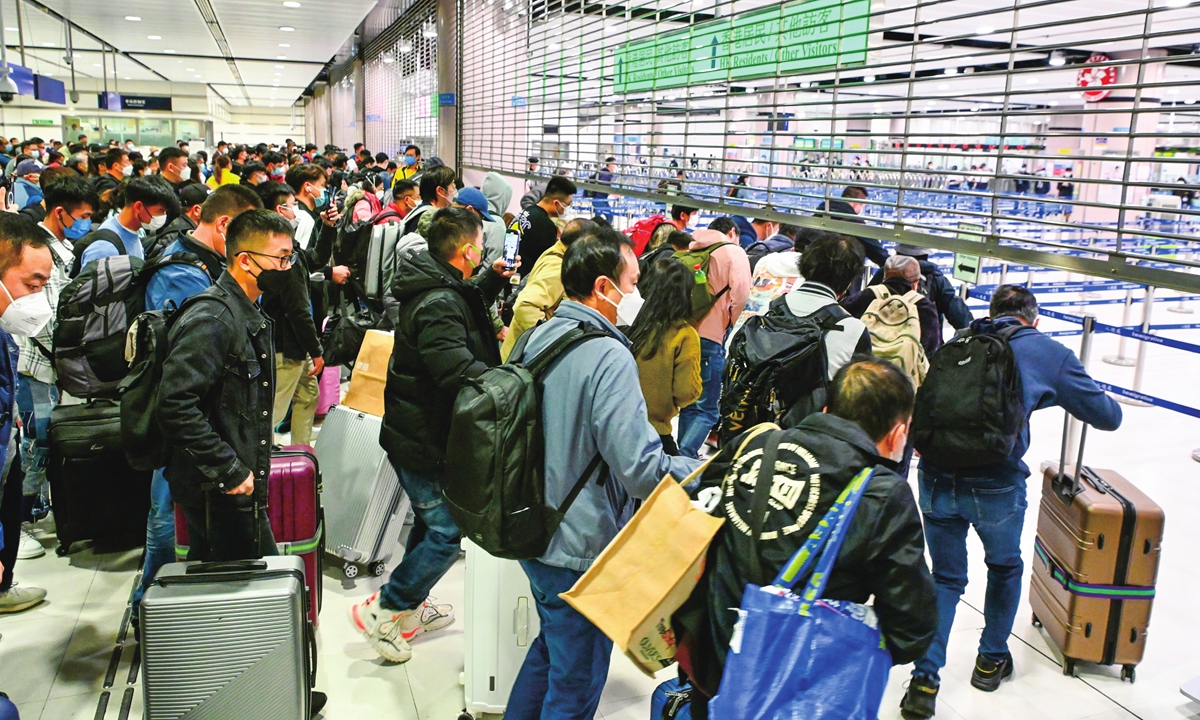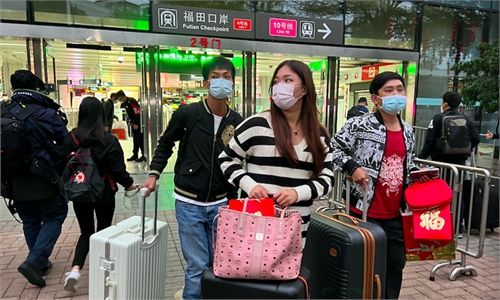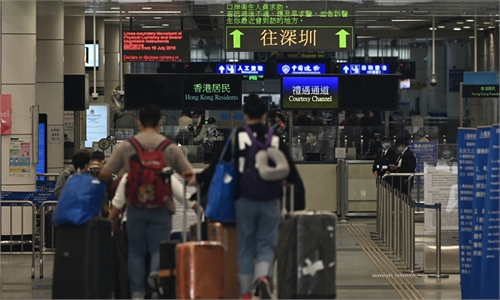Border reopening won’t exert huge pressure on HK’s medical system: local health experts

At about 6:30 am on January 8, 2023, a large number of passengers take the subway at the reopened Lok Ma Chau Station in Hong Kong to enter Shenzhen, South China's Guangdong Province. Photo: VCG
Border reopening between the Chinese mainland and Hong Kong won't cause a more dangerous COVID-19 wave in the city or exert a huge impact on its medical system. Necessary testing measures are in place and previous waves, along with high rates of vaccination, have helped build herd immunity in the city, which has abundant COVID-19 medicines, said Hong Kong health experts.The city's government health advisers said that conditions are mature for Hong Kong to treat the virus as endemic, which means scrapping quarantine for COVID-19 cases, citing reasons such as robust herd immunity.
The border between Hong Kong and the mainland reopened on Sunday, with a 60,000-person daily cap imposed on travelers from each side. A 48-hour negative nucleic acid testing result is required for arrivals from both sides.
Some media have been hyping that the influx of travelers from the mainland, which is enduring a surge of COVID-19 cases, will trigger a wave of infections in Hong Kong and exert a heavy blow on the city's medical system.
Leo Poon Lit-man of the University of Hong Kong told the Global Times that since arrivals are tested, the majority of them will be negative, thus "the border reopening would not affect the situation in Hong Kong a lot."
Hong Kong Special Administrative Region (HKSAR) government pandemic adviser Ivan Hung Fan-ngai, also from the University of Hong Kong, believed that since 83 percent of the city's population already had three shots of vaccines, and many were infected during previous waves, a strong immunity barrier had been formed. Moreover, Hong Kong has a sufficient amount of COVID-19 medicines prepared to weather the possible wave, he told the Global Times.
Hung also advised if arrivals to Hong Kong did not have a major impact on the city's medical system, nucleic acid testing requirements could be relaxed in a few weeks - whether scrapping them entirely or using an antigen test.
Meanwhile, the border opening also sparked an anxiety over COVID and painkiller access in the city. "[Hong Kong] residents are bracing for an influx of mainland Chinese visitors who are hungry to use the city's healthcare sector, which has better access to painkillers and more effective vaccines," the Washington Post reported on January 7.
Hong Kong's customs and excise department told arrivals last week that if they were caught taking excessive controlled medicines out of the city without a permit from HKSAR's health department, they will be prosecuted, or even face a fine of HK$5 million ($640,000) and life imprisonment.
Dennis Lam, a lawmaker and deputy to the National People's Congress, told the Global Times that as of now there is no large amount of shoppers scrambling for COVID-19 related drugs. Lam's colleagues checked some 10 community pharmacies in the districts of Tsim Sha Tsui and Hung Hom. He suggested imposing restrictions on the maximum number of drugs visitors can take when leaving Hong Kong if there is a buying spree.
As for vaccinations, private clinics where the fourth COVID-19 jab was administered have operated in order, with people being inoculated in less than five minutes, Lam said.
The HKSAR government is well prepared to meet the demand for fever medicines, analgesics and vaccines from mainland visitors, according to Lam. The city now has supplies of more than 700 kinds of traditional Chinese medicines containing paracetamol in the market.
Except for shortages of some particular brands, the supplies and prices of COVID-19 related medicines are generally stable. The HKSAR government has made additional purchases to restock for potential demand, Lam said.
Hung believed that Hong Kong would treat COVID-19 as endemic soon, given the fact that strong immunity has been acquired by residents. "There is a very robust herd immunity," he said, citing figures that 83 percent of population had received booster shots and two-thirds had already been infected.
COVID-19 testing should be abandoned for schools and elder care homes, and positive patients could all go to work if they don't suffer severe symptoms, said the government health adviser.
The Chinese mainland downgraded management of COVID-19 from Class A to Class B on Sunday, and published its latest protocol last week, where it abandoned collective quarantine for COVID-19 cases.




